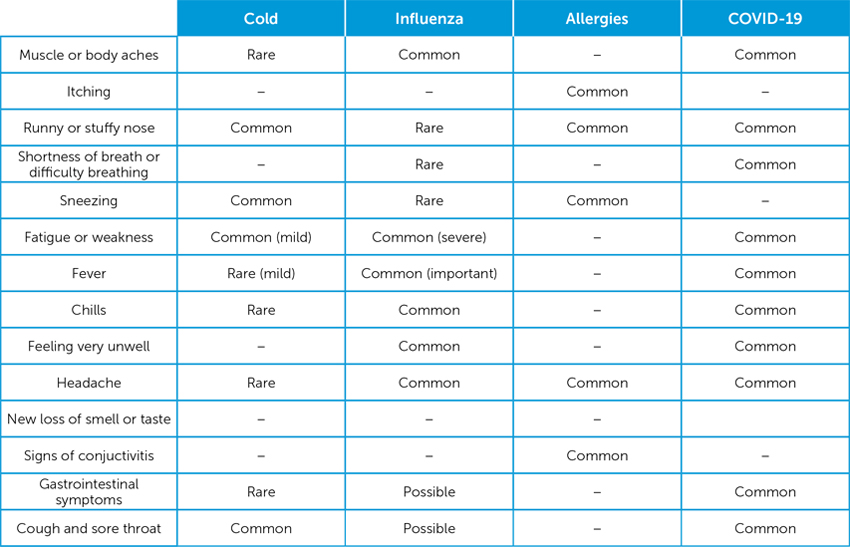Why our customers prefer Blue Cross
- Option of getting insured without a medical exam
- Excellent rates
- Pioneer in the field of health insurance with over 80 years of experience
- Friendly service from experienced agents who can answer your questions and assist you when needed
- Coverage that can be customized to meet your specific needs
- Discounts and savings with our one-of-a-kind Blue Advantage program

COVID-19, common cold, influenza (flu) or allergies?
Published on: October 22, 2020
In a time where ignoring your symptoms can have serious effects, it is crucial more than ever before to be properly informed about possible pulmonary tract infections and pay increased attention to our health. However, it can be difficult to distinguish conditions like the common cold, influenza, allergies or COVID-19, as they all have several symptoms in common.
In collaboration with Dr. Richard Dumouchel, Medical Director at EQ Care, we are here to help provide more clarity.
Common colds: Description and symptoms
The common cold is a very widespread viral respiratory tract infection. It is estimated that an adult can suffer from two to five colds per year. Symptoms often appear slowly, and some people can get infected with this virus without showing any symptoms.
- The most common cold symptoms are:
- Runny nose or congestion
- Sneezing
- Cough and sore throat
- Chills
- Red and watery eyes
- General discomfort
Usually, this virus resolves on its own after about ten days and rarely causes serious and potentially fatal complications.
Influenza (flu): Description and symptoms
Influenza is an infection of the respiratory tract caused by the influenza virus. The most common symptoms - which usually appear very suddenly - are:
- Sudden fever between 39°C and 40°C (102°F and 104°F)
- Sudden cough and sore throat
- Fatigue (sometimes intense)
- Headache
- Muscle pain and stiffness
- Gastric symptoms (especially in children)
Complications can be serious, especially in people who have weakened immune systems, are older or already have breathing problems. For these reasons it is important to stay home if you are suffering from influenza.
This disease is the only one in this article that can be prevented with vaccination. To find out where you can get vaccinated, contact your integrated health and social services centre (CISSS) or your integrated university health and social services centre (CIUSSS).
Seasonal allergies: Description and symptoms
Allergic rhinitis (also called hay fever or seasonal allergies) affects one in five people in Quebec each year. This is generally in full swing from spring to fall, when plants (trees, grass, ragweed) release their pollen into the air.
The most common symptoms of seasonal allergies are:
- Worsening of asthma
- Congestion
- Signs of conjunctivitis (watery eyes, swelling of the eyelids, etc.)
- Sneezing
- Headache
- Clear and profuse nasal discharge
- Tingling or itching of the nose, eyes, throat or ears
One of the main characteristics of seasonal allergies is, as the name suggests, their seasonal nature: so, if you experience the same symptoms every year at the same time, chances are you have allergies.
There are several over-the-counter treatments available to relieve your symptoms. Consult your doctor or pharmacist before using them in case they are not suitable for your condition. If you have severe symptoms, such as asthma, your doctor may prescribe a different treatment.
COVID-19: Description and symptoms
Since its outbreak in December 2019, the coronavirus SARS‑CoV‑2 which is the source of the COVID-19 disease has had an unprecedented impact in our society. At the time of writing more than X million people have contracted the disease around the world, and the numbers keep rising.
Symptoms of COVID-19 can vary greatly from person to person. The list of symptoms associated with this disease is also very broad, containing both gastric, respiratory and general symptoms. According to Health Canada, the most frequently reported are:
- New or worsening cough
- Shortness of breath or difficulty breathing
- Temperature equal to or greater than 38°C (100°F)
- Feeling feverish
- Chills
- Fatigue or weakness
- Muscle pain or stiffness
- Loss of smell or taste
- Headache
- Gastrointestinal symptoms (abdominal pain, diarrhea, vomiting)
- Feeling very unwell
Symptoms of COVID-19 usually appear 48 to 72 hours after exposure to the virus but can sometimes take up to 14 days to appear.
This disease is spreading at lightning speed and it can have very serious consequences (sometimes requiring emergency care), and in more serious cases, resulting in death. It is therefore very important to take this condition seriously and not to minimize its impacts.
When to go get tested for COVID-19?
If you are showing symptoms similar to those of COVID-19, the government of Quebec has set up a COVID-19 Symptom Self-Assessment Tool. This will provide you with recommendations depending on your condition.
If you have been in contact with someone with COVID-19, get tested right away, even if you do not have symptoms.
When you are waiting for your result, isolate yourself and avoid leaving your home at all costs. To learn about the safe measures to adopt if you have or think you have COVID-19, refer to the instructions of the Government of Quebec.
Symptom comparison chart*

References : Health Canada, Government of Quebec
*The absence of text in a box simply means that a symptom is not on the list of symptoms established by the health authorities consulted during the writing of this article.
When to see a doctor
In any case, you must absolutely go to the nearest emergency department if you have one or more of the following symptoms:
- Difficulty breathing
- Blue lips
- Severe chest pain
- Dehydration
- Confusion
- Loss of consciousness
- Difficulty staying awake
When you are in contact with emergency services, let them know your symptoms and advise them if you have COVID-19, if you have been in contact with someone who has it, or if you are waiting for a COVID-19 test result.
***
Most of our individual health or disability insurance products include the EQ Care virtual health care service free of charge.
With this service, you will be able to contact a doctor for symptom clarification and personalized recommendations, when you need them most.